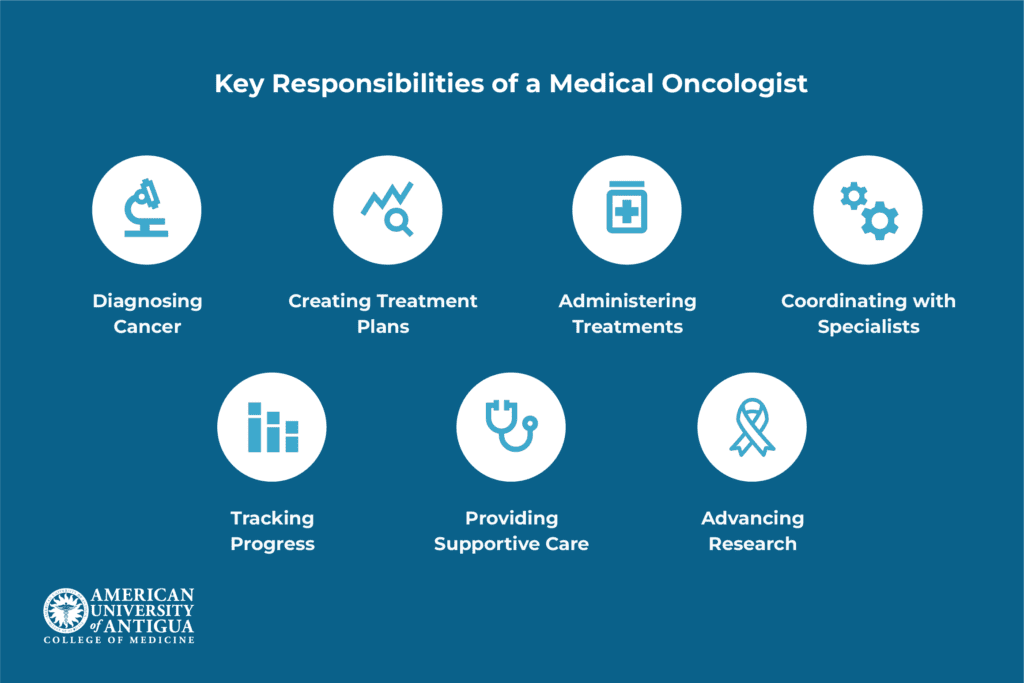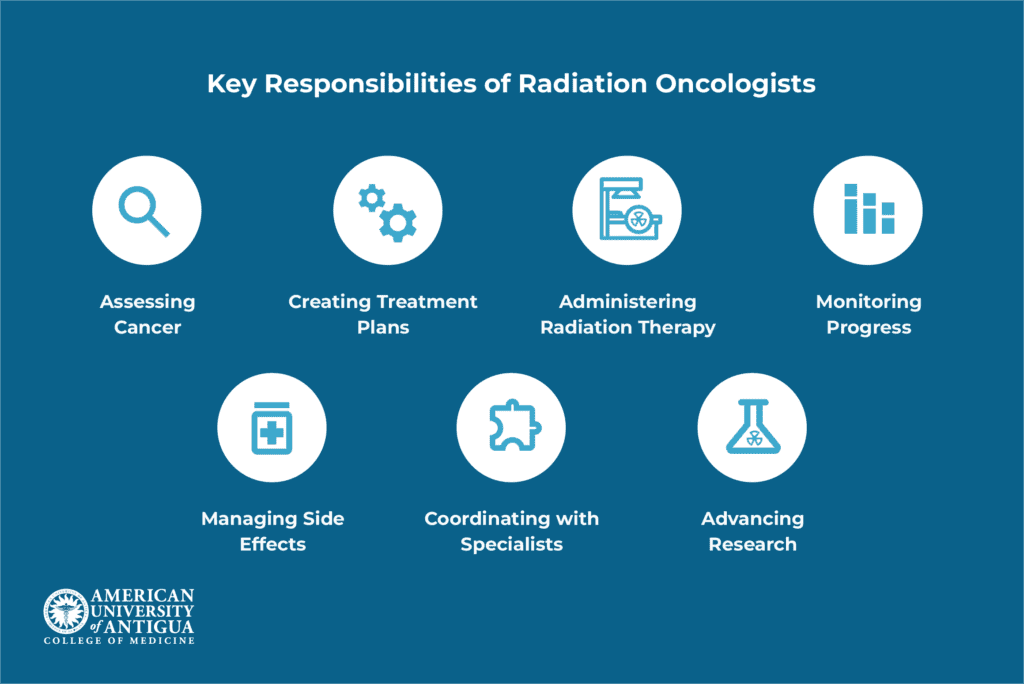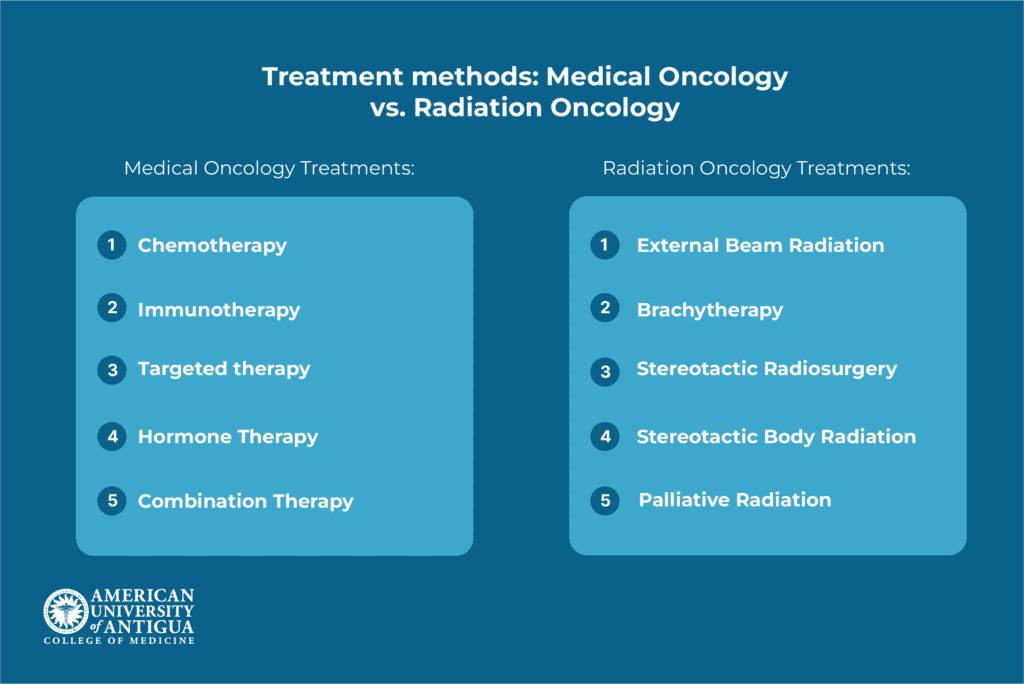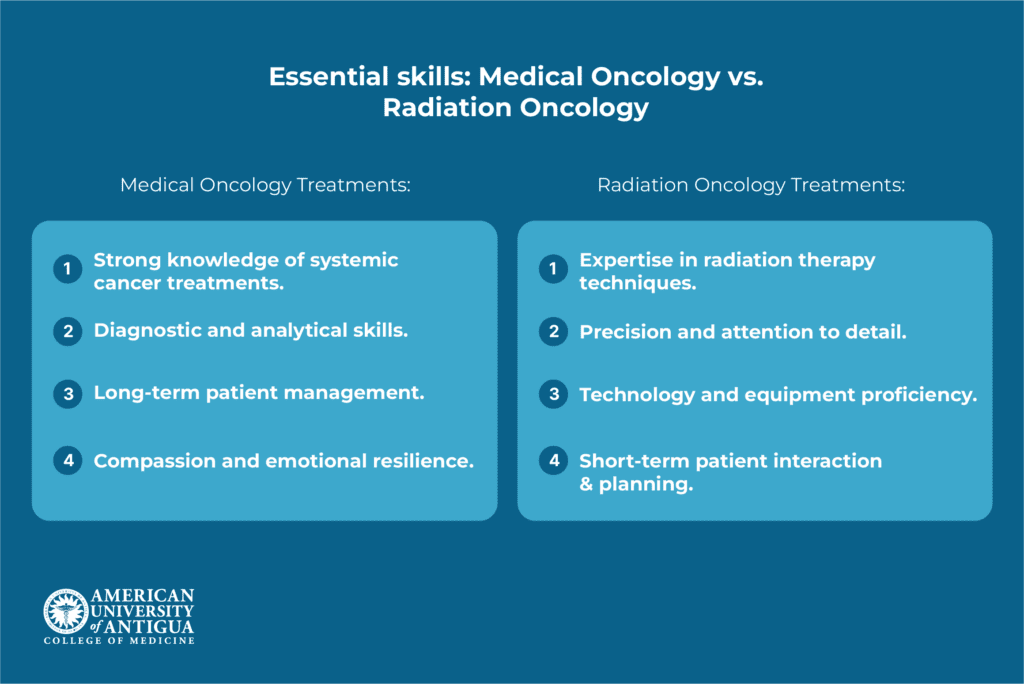Medical Oncology vs Radiation Oncology: Key Differences
Key Takeaways
- Treatment Approach: Radiation oncologists use radiation to target specific body areas, while medical oncologists use drugs to treat cancer systemically.
- Patient care: Medical oncologists provide long-term care and adjust therapies over time, whereas radiation oncologists concentrate on delivering precise, short-term treatment.
- Training: Radiation oncologists specialize in radiation technology, whereas medical oncologists receive training in internal medicine with a focus on cancer treatment.
- Career Considerations: Medical oncology suits individuals who prefer long-term care, while radiation oncology is for those who like precision-based treatments.
Medical oncology treats cancer using systemic therapies such as chemotherapy and immunotherapy, while radiation oncology focuses on localized treatment using radiation.
Oncology is the medical field focused on preventing, diagnosing, and treating cancer. The two main subspecialties of oncology, medical oncology and radiation oncology, take different approaches to cancer treatment. While medical oncology treats cancer with systemic medications that circulate throughout the body, radiation oncology uses targeted radiation therapy to destroy cancer cells in specific areas.
✅ Request information on AUA's MD program TODAY!
YOUR PATH TO SUCCESS BEGINS HERE
Below, we’ll explore the key differences between these specialties – including patient care, training, and career paths – to help you determine which field aligns best with your interests.
What Is Medical Oncology?
A specialized field of medicine, medical oncology focuses on diagnosing, treating, and preventing cancer. This specialty uses systemic therapies such as chemotherapy, immunotherapy, hormone therapy, and targeted drug treatments.
Medical oncologists treat cancer at the cellular level by targeting cancer cells throughout the body, as opposed to surgical or radiation oncologists who focus on localized treatments.
Key responsibilities of medical oncologists

- Diagnosing cancer: Analyze scans, biopsies, and test results to determine the type and stage of cancer.
- Creating treatment plans: Design personalized plans based on the patient’s health and condition.
- Administering treatments: Oversee chemotherapy, immunotherapy, and other treatments while managing side effects.
- Coordinating with specialists: Work alongside surgeons, radiation oncologists, and other professionals to deliver comprehensive care.
- Tracking progress: Monitor treatment effectiveness and make adjustments as needed.
- Providing supportive care: Help patients manage pain, side effects, and emotional challenges to improve their quality of life.
- Advancing research: Participate in clinical trials and studies to develop new treatments and enhance patient outcomes.
What Is Radiation Oncology?
Radiation oncology, another medical specialty, uses high-energy radiation, such as proton beams or X-rays, to treat cancer. Its primary objective is to either eliminate or limit the growth of cancer cells while minimizing damage to healthy tissue.
Depending on the type and stage of cancer, radiation therapy can be used either as a primary treatment or alongside surgery and chemotherapy.
Key responsibilities of radiation oncologists

- Assessing cancer: Examine scans and test results to determine the size, location, and type of the tumor.
- Creating treatment plans: Design precise plans to maximize effectiveness while protecting healthy tissue.
- Administering radiation therapy: Manage treatment sessions, ensuring accuracy and patient safety.
- Monitoring progress: Assess the effectiveness of radiation therapy and make adjustments as needed.
- Managing side effects: Help patients manage side effects like fatigue, skin irritation, and nausea.
- Coordinating with specialists: Work closely with other healthcare providers, including surgeons and medical oncologists, to ensure comprehensive cancer care.
- Advancing research: Contribute to studies and clinical trials to improve radiation therapy techniques and patient outcomes.
Key Differences Between Medical Oncology and Radiation Oncology
Although treating cancer is the main goal of both medical and radiation oncology, there are some differences between the two fields, such as treatment approaches, patient care priorities, educational requirements, and career pathways. In the paragraphs below, we’ll discuss these differences in more detail.
Treatment methods
One of the main differences between medical and radiation oncology is the approach each specialty takes to treat cancer, which depends on the cancer’s type, location, and stage. Medical oncology uses medication to target cancer cells throughout the body or enhance the immune system’s ability to fight them, while radiation oncology employs radiation to eliminate cancer cells in specific areas, often combining both methods for optimal results.
Here are some of the treatment methods for each specialty.

Medical Oncology Treatments
- Chemotherapy: Uses powerful medication to destroy or limit the growth of cancer cells.
- Immunotherapy: Enhances the body’s immune system against cancer cells.
- Targeted therapy: Employs medications that specifically target and attack cancer cells while avoiding harm to healthy cells.
- Hormone Therapy: Reduces or blocks hormones that drive the growth of hormone-driven cancers, such as prostate and breast cancer.
- Combination Therapy: Combines various therapies, including immunotherapy and chemotherapy, to boost their effectiveness.
Radiation Oncology Treatments
- External Beam Radiation Therapy (EBRT): Delivers high-energy radiation from outside the body to target tumors.
- Brachytherapy (Internal Radiation): Places tiny radioactive materials inside or near the cancer to target it directly.
- Stereotactic Radiosurgery (SRS) and Stereotactic Body Radiation Therapy (SBRT): Use precise radiation to treat small tumors in the brain or body.
- Palliative Radiation: Used for advanced cancer patients to relieve pain and other symptoms, improving their comfort.
Patient care focus
Patient care approaches of medical oncologists and radiation oncologists differ in treatment duration, follow-up frequency, and overall methodology. Medical oncologists provide continuous care, often for months or even years. They manage side effects and appropriately adjust treatments such as immunotherapy and chemotherapy throughout the course of treatment.
On the other hand, radiation oncologists typically administer highly structured, time-limited treatments. Radiation therapy is usually delivered daily over a few weeks, with fewer follow-up visits once treatment is finished.
Training and education requirements
Both medical oncologists and radiation oncologists undergo extensive training, but their paths differ. Medical oncologists first complete medical school, followed by a three-year internal medicine residency. They then complete a two- to three-year oncology fellowship focusing on treating cancer using immunotherapy, chemotherapy, and targeted treatments.
In contrast, radiation oncologists complete a four-year residency in radiation oncology after medical school, followed by a one-year general internship.
While both specialties require a deep understanding of cancer biology and patient care, medical oncology focuses more on systemic drug treatments, whereas radiation oncology emphasizes radiation physics, imaging, and precise tumor-targeting techniques.
Career paths and specializations
Medical oncology and radiation oncology offer different career options and opportunities based on individual interests. Medical oncologists typically treat cancer patients in private clinics or hospitals as part of their clinical practice. Some may also choose to explore innovative cancer treatments through academic medicine and research.
Medical oncologists can specialize in pediatric oncology, focusing on treating cancer in children, or hematology-oncology, which addresses blood cancers. Additionally, they may contribute to the development of new cancer medications in the biotech or pharmaceutical industries.
Career options for radiation oncologists are likewise diverse. They may treat cancer using radiation therapy in both private clinics and hospitals. Some focus on advanced radiation treatments like proton therapy or brachytherapy, which delivers radiation directly to tumors. Others may pursue academic or research roles, advancing the field of radiation therapy and improving treatment technologies.
Essential Skills Required for Each Field
Medical and radiation oncologists need different skill sets to excel in their careers.
Medical oncologists must have a thorough understanding of systemic cancer treatments, including immunotherapy, chemotherapy, and targeted therapies. They need strong diagnostic and analytical skills to monitor cancer progression and adjust treatments accordingly. Since they provide long-term care, they must possess excellent patient management abilities, along with compassion and emotional resilience, to support patients through difficult treatment regimens.
Radiation oncologists, on the other hand, require expertise in radiation therapy techniques to accurately target tumors while minimizing damage to surrounding healthy tissues. They need precision and attention to detail when planning and administering treatments, as well as proficiency with advanced radiation technology to operate complex equipment. While their patient interactions are typically shorter than those of medical oncologists, radiation oncologists must excel in planning and coordinating treatments within a limited timeframe to ensure optimal outcomes.

Which Oncology Path is Right for You?
Both medical oncology and radiation oncology play essential roles in cancer care, but choosing the right path depends on your interests and strengths. If you prefer long-term patient management, adjusting treatments over time, and using systemic therapies, medical oncology might be the right choice. This field requires strong diagnostic skills, an in-depth understanding of cancer biology, and emotional resilience to support patients throughout their treatment journey.
On the other hand, if you’re drawn to technology-driven, precision-focused treatments and working with radiation equipment, radiation oncology could be a better fit. This specialty demands attention to detail, technical proficiency, and delivering high-precision care within a defined treatment period.
Conclusion
Both medical oncology and radiation oncology offer rewarding careers for those passionate about cancer treatment. Medical oncologists focus on long-term patient care, using systemic treatments like chemotherapy and immunotherapy, while radiation oncologists specialize in targeted, technology-driven therapies to destroy cancer cells.
Each field requires unique skills, training, and career paths, making it important to choose the one that aligns with your strengths and interests. Both specialties provide the opportunity to make a significant impact in the fight against cancer.
Explore how AUAMED’s MD programs can help you achieve your dream of becoming a doctor. Learn more today!
Frequently Asked Questions
Can a doctor specialize in both medical and radiation oncology?
While it’s rare, some doctors may choose to specialize in both medical and radiation oncology, but they typically focus on one due to the demands of each field.
Is radiation therapy more effective than chemotherapy?
Radiation therapy and chemotherapy are different treatments, and their effectiveness depends on cancer type, stage, and individual patient needs. Neither is universally more effective than the other.
How do medical and radiation oncologists work with surgical oncologists?
Medical and radiation oncologists collaborate with surgical oncologists to develop comprehensive treatment plans, combining surgery, chemotherapy, and radiation to ensure the best possible outcomes for the patient.
✅ Request information on AUA's MD program TODAY!